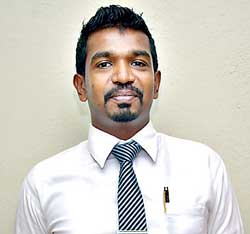Tuesday Feb 24, 2026
Tuesday Feb 24, 2026
Wednesday, 20 January 2016 00:00 - - {{hitsCtrl.values.hits}}
 Even though there are many higher educational opportunities which are available in the public sector and private sector, the lack of understanding of the importance of education has become as a major issue in the Negombo region
Even though there are many higher educational opportunities which are available in the public sector and private sector, the lack of understanding of the importance of education has become as a major issue in the Negombo region
By Madura Thiwanka Pathirana
As a young entrepreneur I always prefer to observe the behavioural patterns of other young people whom I meet in my day-to-day life. With the development of societal changes due to many external factors in general society, youth behavioural patterns are changing in a remarkable manner. I want to share my personal ideas about societal issues which I’ve seen in the behavioural patterns of youth in Negombo. Since I have lived in Negombo for more than 20 years, I have observed these practices regularly.
The main issue with the community in which I live in is the lack of educational encouragement among the younger crowd. Even though there are many higher educational opportunities which are available in the public sector and private sector, the lack of understanding of the importance of education has become as a major issue in the Negombo region.
Low-skill employment
Taking into consideration the personal observations which I have carried out during the last three years, a majority of younger people in the community seek minor job opportunities in the fisheries and tourism sectors. They wish to get into these simply by obtaining primary educational qualifications. The younger crowd believes that engaging in a private sector firm as a minor employee will give them the life they envision in their dreams rather than wasting their time on higher education. 
The Sri Lanka National Human Development Report (NHDR) 2014 on Youth and Development states that in a survey conducted in 2013, the youth of the nation continue to focus on low-skill employment which poses an obstacle when aspiring towards potential economic transition. Only about 16% of the labour force as a whole has received formal vocational or technical training (NHDR).
If the fisheries sector engages with a professional practice, I believe the contribution they can make to the national economy will be higher than what they contribute now. An arguably low-quality output is what we are getting from the daily fish production; unprofessional and low productive practices are the main reasons for the low income. This has to be changed if the younger generation is focusing on engaging with the fisheries sector. The tourism sector in Negombo faces the same issue when it comes to recruiting experienced and skilled labour. Most of the unprofessional and less skilled youth who are a part of the tourism sector in the region, usually degrade the quality of Sri Lankan tourism.
Many public and private sector institutes operate in the region to cater to students who graduate from high school.
Since most of the private institutes consider paying a lower salary scale to maintain their cost of operations, the top management of those institutes do not encourage their employees to pursue higher educational opportunities. Due to this mechanism, a majority of the younger people are unaware of professional practices and lag behind modern work practices.
Some of the reasons behind this are:
1. The poor educational background of the family
2. Low-quality secondary and primary education system
3. Negative societal values and beliefs
Illegal practices
With the passing of time, younger people recognise that the salary scale which they are generating is not adequate enough to maintain a family. This has lead them to participate in illegal practices such as unlawful migration practices which the people of Negombo have known to be engaged in for the last 10 years.
Around 25% of the younger generation still believe that migrating to another country (even via unlawful methods) will give them a better future than what they have now. According to the NHDR, 35% of Sri Lankans who venture overseas in this manner are between the ages of 15 and 29. Another 34% of youth try to move to European and Asian countries seeking at least minor employment opportunities there.
Apart from that, drug addiction among the younger generation in the community is increasing rapidly due to their poor educational background. Some very dangerous drugs were captured during recent raids in the area. During any given weekend, more than 85% of the people who hang around the beach in Negombo are young people who are addicted to alcohol, smoking and drugs. Due to this, illegal products are rapidly being promoted in the region on a daily basis. Add in sexual promiscuity with drugs, and there stands a real risk of Sexually Transmitted Diseases (STDs) spreading rapidly in the region, particularly among the young crowd.
My recommendations to overcome these issues are as follows:
1. Developing a cultural and social development plan with the religious leaders in the region.
2. Close interaction with the low income families to guide them towards a better future.
3. Implementation of career enhancement programs on a continual basis to open the world to this hidden sub-society and to motivate the younger crowd to progress academically.
4. Creation of special awareness programmes in collaboration with schools, regarding the risks associated with alcohol, drugs, unlawful migration and unsafe sex practices.
5. Implementing a skills development program which maintains a close relationship with the fisheries sector stakeholders and tourism sector stakeholders, to enhance the existing skills of the younger people who are engaged in the industry at the moment.
Critical attention should be provided by responsible parties in order to safeguard the younger generation by increasing awareness about safe sex practices to avoid the spread of STDs and the harmful effects of narcotics. Top level personalities should encourage youth to get involved in the national production instead. In conclusion, I believe as a tourist destination, if Negombo maintains the current practices, it will result in damaging the existing tourism status, or become a tourist destination which is full of illegal practices.
(UNLOCKED is a space for Sri Lankan youth to express their views and opinions on development with the aim of creating positive change in the world. The views expressed in the blogs are solely those of the authors. UNDP Sri Lanka and Daily FT does not represent or endorse the views expressed in these blogs. Read more about the UNLOCKED initiative www.lk.undp.org.)